Evaluating Public Policy's Role in Choice of Law (Rome Regulations)
VerifiedAdded on 2020/12/29
|16
|5663
|96
Report
AI Summary
This report critically evaluates the role of public policy in determining the choice of law applicable to both contractual and non-contractual disputes within the context of the Rome Regulations. It begins by defining public policy and its advantages, emphasizing its importance in international commercial law. The report then explores different types of public policies and their limitations. A significant portion is dedicated to evaluating the role of public policy in ascertaining the choice of law, specifically in relation to the Rome I and Rome II Regulations. The report discusses how these regulations determine the choice of law for international commercial disputes, including the principles applicable to both contractual and non-contractual obligations. It also addresses the issues of limitation of public policy on the choice of law doctrine. The analysis covers the application of specific articles within the Rome I and Rome II regulations, highlighting their impact on dispute resolution and the enforcement of legal principles in international commercial transactions.

critically evaluate the role of public policy in ascertaining the choice of law applicable to
both c
both c
Paraphrase This Document
Need a fresh take? Get an instant paraphrase of this document with our AI Paraphraser
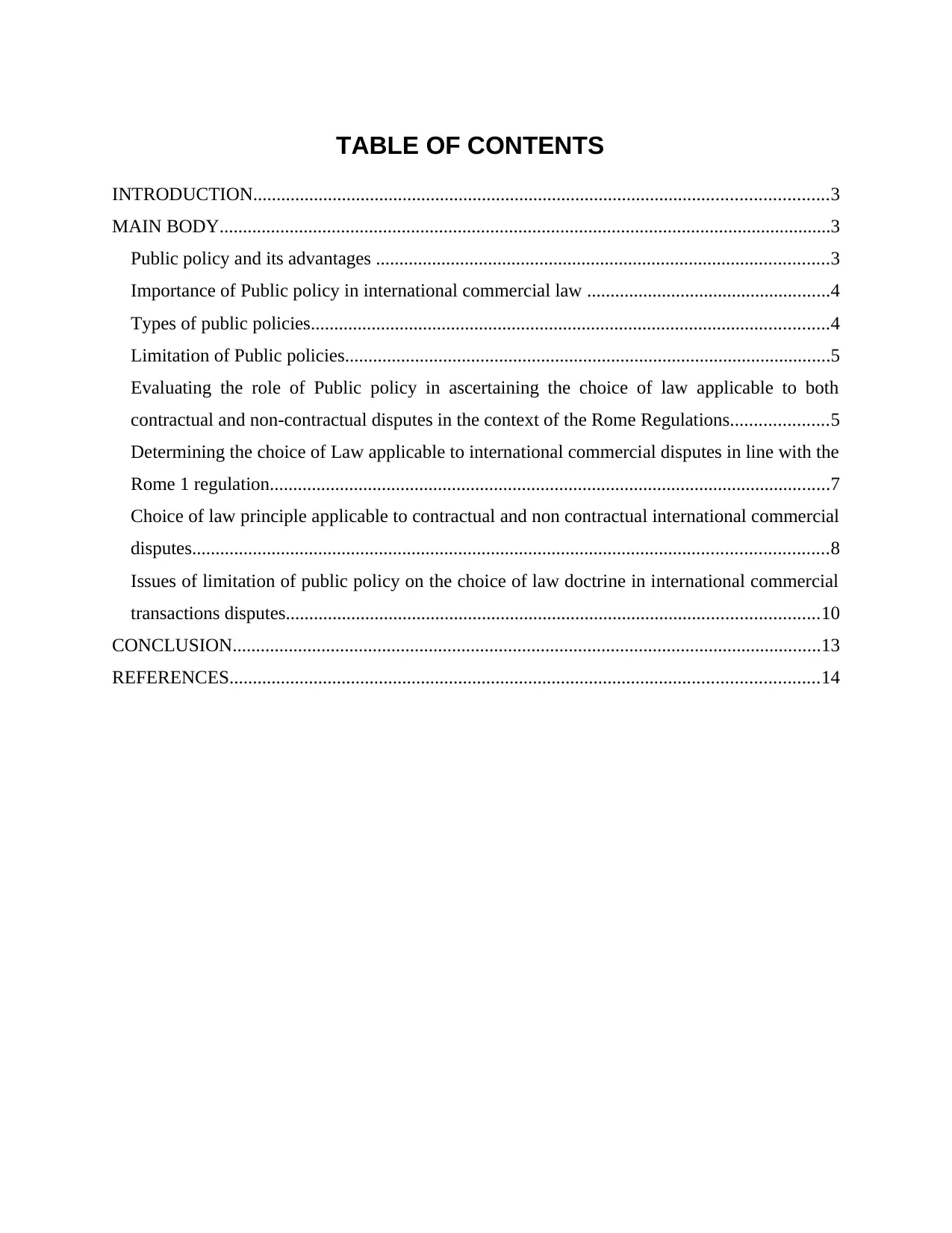
TABLE OF CONTENTS
INTRODUCTION...........................................................................................................................3
MAIN BODY...................................................................................................................................3
Public policy and its advantages .................................................................................................3
Importance of Public policy in international commercial law ....................................................4
Types of public policies...............................................................................................................4
Limitation of Public policies........................................................................................................5
Evaluating the role of Public policy in ascertaining the choice of law applicable to both
contractual and non-contractual disputes in the context of the Rome Regulations.....................5
Determining the choice of Law applicable to international commercial disputes in line with the
Rome 1 regulation........................................................................................................................7
Choice of law principle applicable to contractual and non contractual international commercial
disputes........................................................................................................................................8
Issues of limitation of public policy on the choice of law doctrine in international commercial
transactions disputes..................................................................................................................10
CONCLUSION..............................................................................................................................13
REFERENCES..............................................................................................................................14
INTRODUCTION...........................................................................................................................3
MAIN BODY...................................................................................................................................3
Public policy and its advantages .................................................................................................3
Importance of Public policy in international commercial law ....................................................4
Types of public policies...............................................................................................................4
Limitation of Public policies........................................................................................................5
Evaluating the role of Public policy in ascertaining the choice of law applicable to both
contractual and non-contractual disputes in the context of the Rome Regulations.....................5
Determining the choice of Law applicable to international commercial disputes in line with the
Rome 1 regulation........................................................................................................................7
Choice of law principle applicable to contractual and non contractual international commercial
disputes........................................................................................................................................8
Issues of limitation of public policy on the choice of law doctrine in international commercial
transactions disputes..................................................................................................................10
CONCLUSION..............................................................................................................................13
REFERENCES..............................................................................................................................14
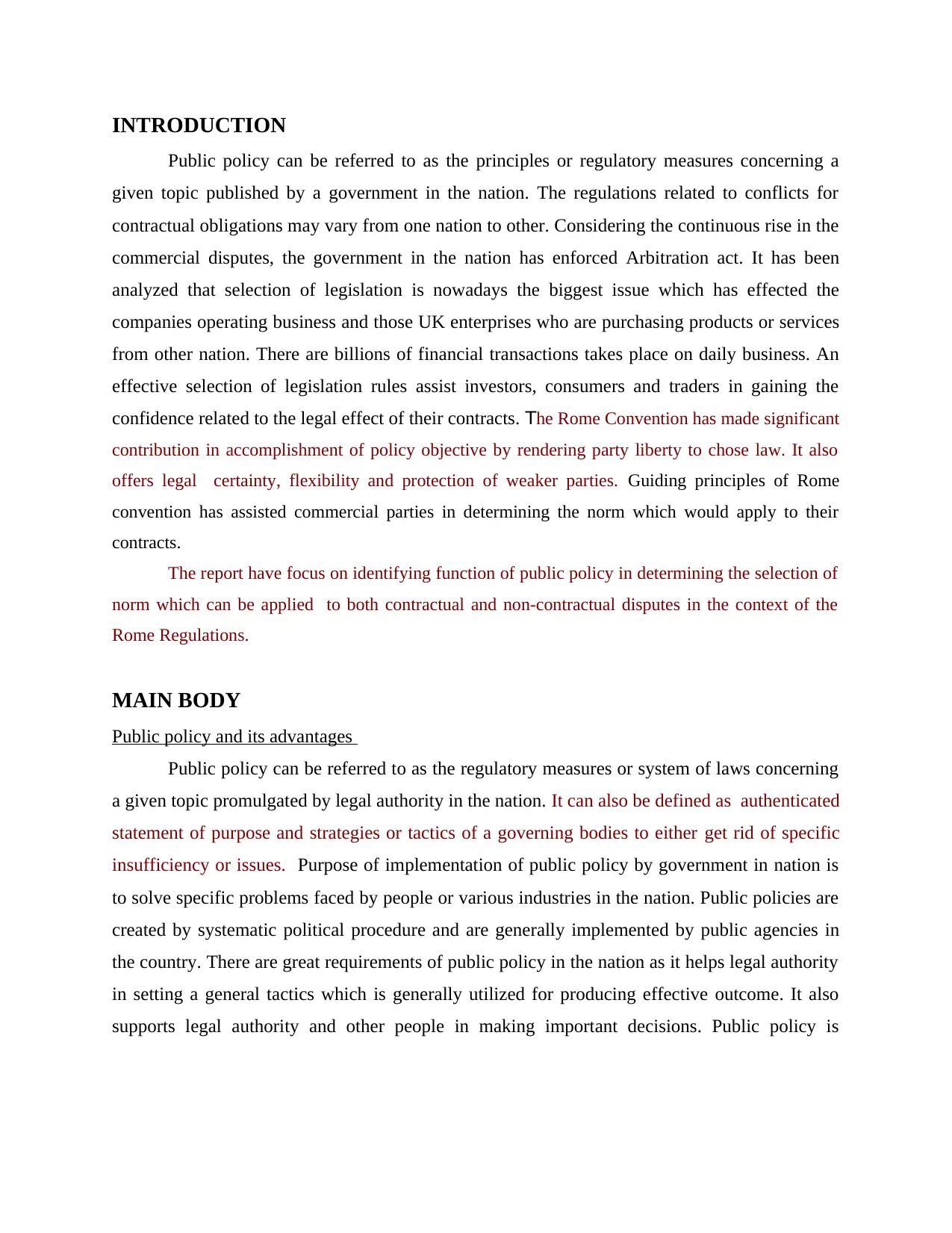
INTRODUCTION
Public policy can be referred to as the principles or regulatory measures concerning a
given topic published by a government in the nation. The regulations related to conflicts for
contractual obligations may vary from one nation to other. Considering the continuous rise in the
commercial disputes, the government in the nation has enforced Arbitration act. It has been
analyzed that selection of legislation is nowadays the biggest issue which has effected the
companies operating business and those UK enterprises who are purchasing products or services
from other nation. There are billions of financial transactions takes place on daily business. An
effective selection of legislation rules assist investors, consumers and traders in gaining the
confidence related to the legal effect of their contracts. The Rome Convention has made significant
contribution in accomplishment of policy objective by rendering party liberty to chose law. It also
offers legal certainty, flexibility and protection of weaker parties. Guiding principles of Rome
convention has assisted commercial parties in determining the norm which would apply to their
contracts.
The report have focus on identifying function of public policy in determining the selection of
norm which can be applied to both contractual and non-contractual disputes in the context of the
Rome Regulations.
MAIN BODY
Public policy and its advantages
Public policy can be referred to as the regulatory measures or system of laws concerning
a given topic promulgated by legal authority in the nation. It can also be defined as authenticated
statement of purpose and strategies or tactics of a governing bodies to either get rid of specific
insufficiency or issues. Purpose of implementation of public policy by government in nation is
to solve specific problems faced by people or various industries in the nation. Public policies are
created by systematic political procedure and are generally implemented by public agencies in
the country. There are great requirements of public policy in the nation as it helps legal authority
in setting a general tactics which is generally utilized for producing effective outcome. It also
supports legal authority and other people in making important decisions. Public policy is
Public policy can be referred to as the principles or regulatory measures concerning a
given topic published by a government in the nation. The regulations related to conflicts for
contractual obligations may vary from one nation to other. Considering the continuous rise in the
commercial disputes, the government in the nation has enforced Arbitration act. It has been
analyzed that selection of legislation is nowadays the biggest issue which has effected the
companies operating business and those UK enterprises who are purchasing products or services
from other nation. There are billions of financial transactions takes place on daily business. An
effective selection of legislation rules assist investors, consumers and traders in gaining the
confidence related to the legal effect of their contracts. The Rome Convention has made significant
contribution in accomplishment of policy objective by rendering party liberty to chose law. It also
offers legal certainty, flexibility and protection of weaker parties. Guiding principles of Rome
convention has assisted commercial parties in determining the norm which would apply to their
contracts.
The report have focus on identifying function of public policy in determining the selection of
norm which can be applied to both contractual and non-contractual disputes in the context of the
Rome Regulations.
MAIN BODY
Public policy and its advantages
Public policy can be referred to as the regulatory measures or system of laws concerning
a given topic promulgated by legal authority in the nation. It can also be defined as authenticated
statement of purpose and strategies or tactics of a governing bodies to either get rid of specific
insufficiency or issues. Purpose of implementation of public policy by government in nation is
to solve specific problems faced by people or various industries in the nation. Public policies are
created by systematic political procedure and are generally implemented by public agencies in
the country. There are great requirements of public policy in the nation as it helps legal authority
in setting a general tactics which is generally utilized for producing effective outcome. It also
supports legal authority and other people in making important decisions. Public policy is
⊘ This is a preview!⊘
Do you want full access?
Subscribe today to unlock all pages.

Trusted by 1+ million students worldwide
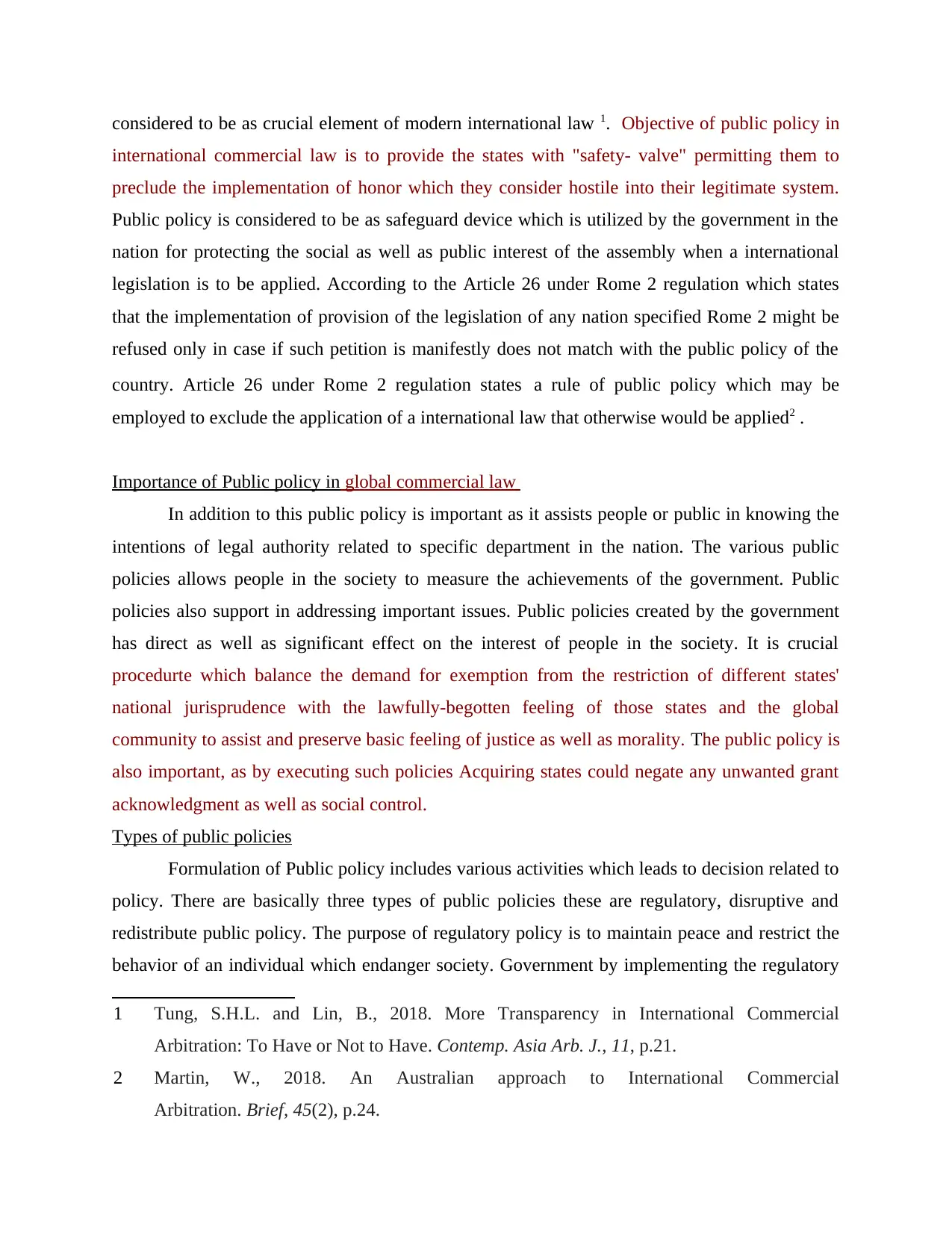
considered to be as crucial element of modern international law 1. Objective of public policy in
international commercial law is to provide the states with "safety- valve" permitting them to
preclude the implementation of honor which they consider hostile into their legitimate system.
Public policy is considered to be as safeguard device which is utilized by the government in the
nation for protecting the social as well as public interest of the assembly when a international
legislation is to be applied. According to the Article 26 under Rome 2 regulation which states
that the implementation of provision of the legislation of any nation specified Rome 2 might be
refused only in case if such petition is manifestly does not match with the public policy of the
country. Article 26 under Rome 2 regulation states a rule of public policy which may be
employed to exclude the application of a international law that otherwise would be applied2 .
Importance of Public policy in global commercial law
In addition to this public policy is important as it assists people or public in knowing the
intentions of legal authority related to specific department in the nation. The various public
policies allows people in the society to measure the achievements of the government. Public
policies also support in addressing important issues. Public policies created by the government
has direct as well as significant effect on the interest of people in the society. It is crucial
procedurte which balance the demand for exemption from the restriction of different states'
national jurisprudence with the lawfully-begotten feeling of those states and the global
community to assist and preserve basic feeling of justice as well as morality. The public policy is
also important, as by executing such policies Acquiring states could negate any unwanted grant
acknowledgment as well as social control.
Types of public policies
Formulation of Public policy includes various activities which leads to decision related to
policy. There are basically three types of public policies these are regulatory, disruptive and
redistribute public policy. The purpose of regulatory policy is to maintain peace and restrict the
behavior of an individual which endanger society. Government by implementing the regulatory
1 Tung, S.H.L. and Lin, B., 2018. More Transparency in International Commercial
Arbitration: To Have or Not to Have. Contemp. Asia Arb. J., 11, p.21.
2 Martin, W., 2018. An Australian approach to International Commercial
Arbitration. Brief, 45(2), p.24.
international commercial law is to provide the states with "safety- valve" permitting them to
preclude the implementation of honor which they consider hostile into their legitimate system.
Public policy is considered to be as safeguard device which is utilized by the government in the
nation for protecting the social as well as public interest of the assembly when a international
legislation is to be applied. According to the Article 26 under Rome 2 regulation which states
that the implementation of provision of the legislation of any nation specified Rome 2 might be
refused only in case if such petition is manifestly does not match with the public policy of the
country. Article 26 under Rome 2 regulation states a rule of public policy which may be
employed to exclude the application of a international law that otherwise would be applied2 .
Importance of Public policy in global commercial law
In addition to this public policy is important as it assists people or public in knowing the
intentions of legal authority related to specific department in the nation. The various public
policies allows people in the society to measure the achievements of the government. Public
policies also support in addressing important issues. Public policies created by the government
has direct as well as significant effect on the interest of people in the society. It is crucial
procedurte which balance the demand for exemption from the restriction of different states'
national jurisprudence with the lawfully-begotten feeling of those states and the global
community to assist and preserve basic feeling of justice as well as morality. The public policy is
also important, as by executing such policies Acquiring states could negate any unwanted grant
acknowledgment as well as social control.
Types of public policies
Formulation of Public policy includes various activities which leads to decision related to
policy. There are basically three types of public policies these are regulatory, disruptive and
redistribute public policy. The purpose of regulatory policy is to maintain peace and restrict the
behavior of an individual which endanger society. Government by implementing the regulatory
1 Tung, S.H.L. and Lin, B., 2018. More Transparency in International Commercial
Arbitration: To Have or Not to Have. Contemp. Asia Arb. J., 11, p.21.
2 Martin, W., 2018. An Australian approach to International Commercial
Arbitration. Brief, 45(2), p.24.
Paraphrase This Document
Need a fresh take? Get an instant paraphrase of this document with our AI Paraphraser
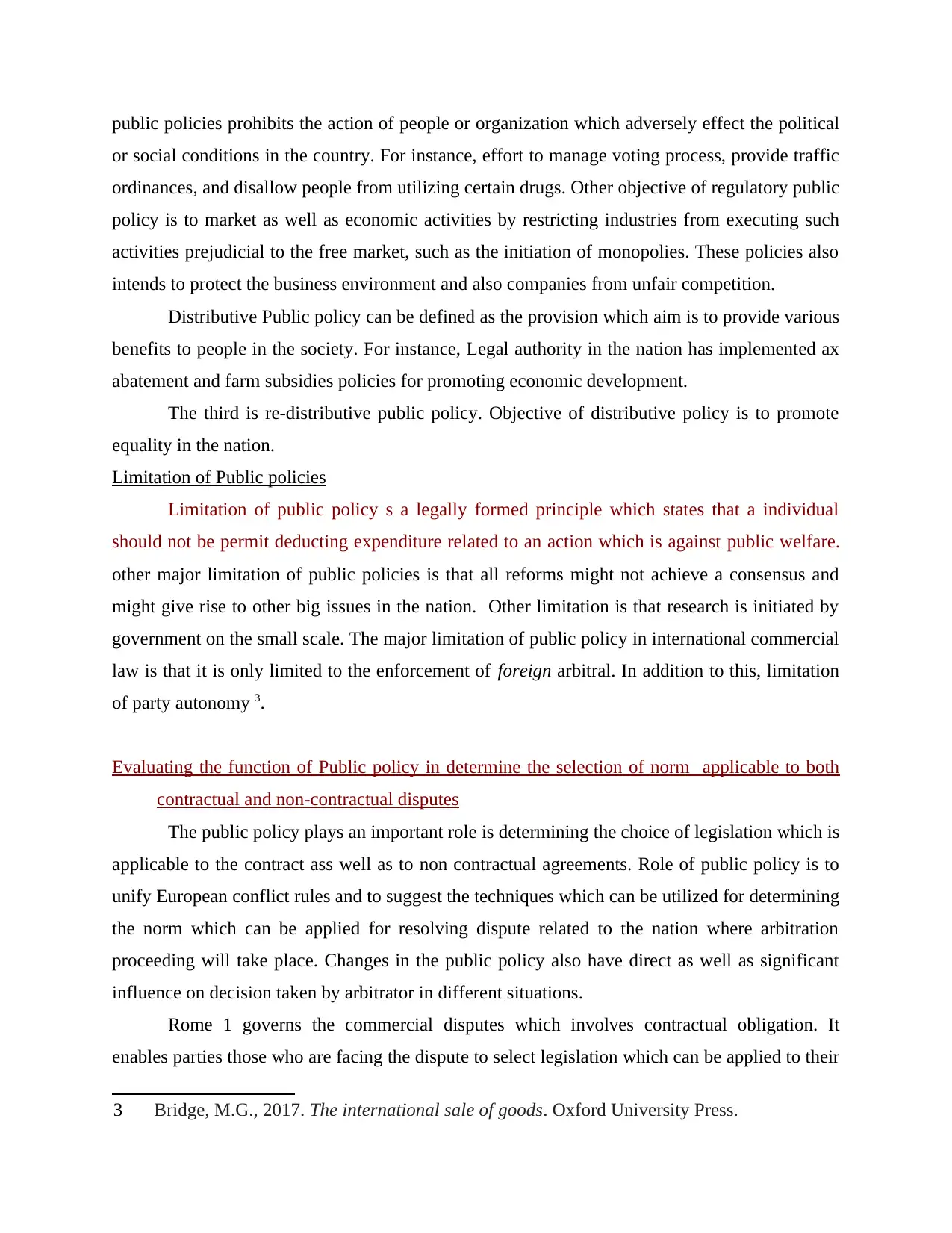
public policies prohibits the action of people or organization which adversely effect the political
or social conditions in the country. For instance, effort to manage voting process, provide traffic
ordinances, and disallow people from utilizing certain drugs. Other objective of regulatory public
policy is to market as well as economic activities by restricting industries from executing such
activities prejudicial to the free market, such as the initiation of monopolies. These policies also
intends to protect the business environment and also companies from unfair competition.
Distributive Public policy can be defined as the provision which aim is to provide various
benefits to people in the society. For instance, Legal authority in the nation has implemented ax
abatement and farm subsidies policies for promoting economic development.
The third is re-distributive public policy. Objective of distributive policy is to promote
equality in the nation.
Limitation of Public policies
Limitation of public policy s a legally formed principle which states that a individual
should not be permit deducting expenditure related to an action which is against public welfare.
other major limitation of public policies is that all reforms might not achieve a consensus and
might give rise to other big issues in the nation. Other limitation is that research is initiated by
government on the small scale. The major limitation of public policy in international commercial
law is that it is only limited to the enforcement of foreign arbitral. In addition to this, limitation
of party autonomy 3.
Evaluating the function of Public policy in determine the selection of norm applicable to both
contractual and non-contractual disputes
The public policy plays an important role is determining the choice of legislation which is
applicable to the contract ass well as to non contractual agreements. Role of public policy is to
unify European conflict rules and to suggest the techniques which can be utilized for determining
the norm which can be applied for resolving dispute related to the nation where arbitration
proceeding will take place. Changes in the public policy also have direct as well as significant
influence on decision taken by arbitrator in different situations.
Rome 1 governs the commercial disputes which involves contractual obligation. It
enables parties those who are facing the dispute to select legislation which can be applied to their
3 Bridge, M.G., 2017. The international sale of goods. Oxford University Press.
or social conditions in the country. For instance, effort to manage voting process, provide traffic
ordinances, and disallow people from utilizing certain drugs. Other objective of regulatory public
policy is to market as well as economic activities by restricting industries from executing such
activities prejudicial to the free market, such as the initiation of monopolies. These policies also
intends to protect the business environment and also companies from unfair competition.
Distributive Public policy can be defined as the provision which aim is to provide various
benefits to people in the society. For instance, Legal authority in the nation has implemented ax
abatement and farm subsidies policies for promoting economic development.
The third is re-distributive public policy. Objective of distributive policy is to promote
equality in the nation.
Limitation of Public policies
Limitation of public policy s a legally formed principle which states that a individual
should not be permit deducting expenditure related to an action which is against public welfare.
other major limitation of public policies is that all reforms might not achieve a consensus and
might give rise to other big issues in the nation. Other limitation is that research is initiated by
government on the small scale. The major limitation of public policy in international commercial
law is that it is only limited to the enforcement of foreign arbitral. In addition to this, limitation
of party autonomy 3.
Evaluating the function of Public policy in determine the selection of norm applicable to both
contractual and non-contractual disputes
The public policy plays an important role is determining the choice of legislation which is
applicable to the contract ass well as to non contractual agreements. Role of public policy is to
unify European conflict rules and to suggest the techniques which can be utilized for determining
the norm which can be applied for resolving dispute related to the nation where arbitration
proceeding will take place. Changes in the public policy also have direct as well as significant
influence on decision taken by arbitrator in different situations.
Rome 1 governs the commercial disputes which involves contractual obligation. It
enables parties those who are facing the dispute to select legislation which can be applied to their
3 Bridge, M.G., 2017. The international sale of goods. Oxford University Press.
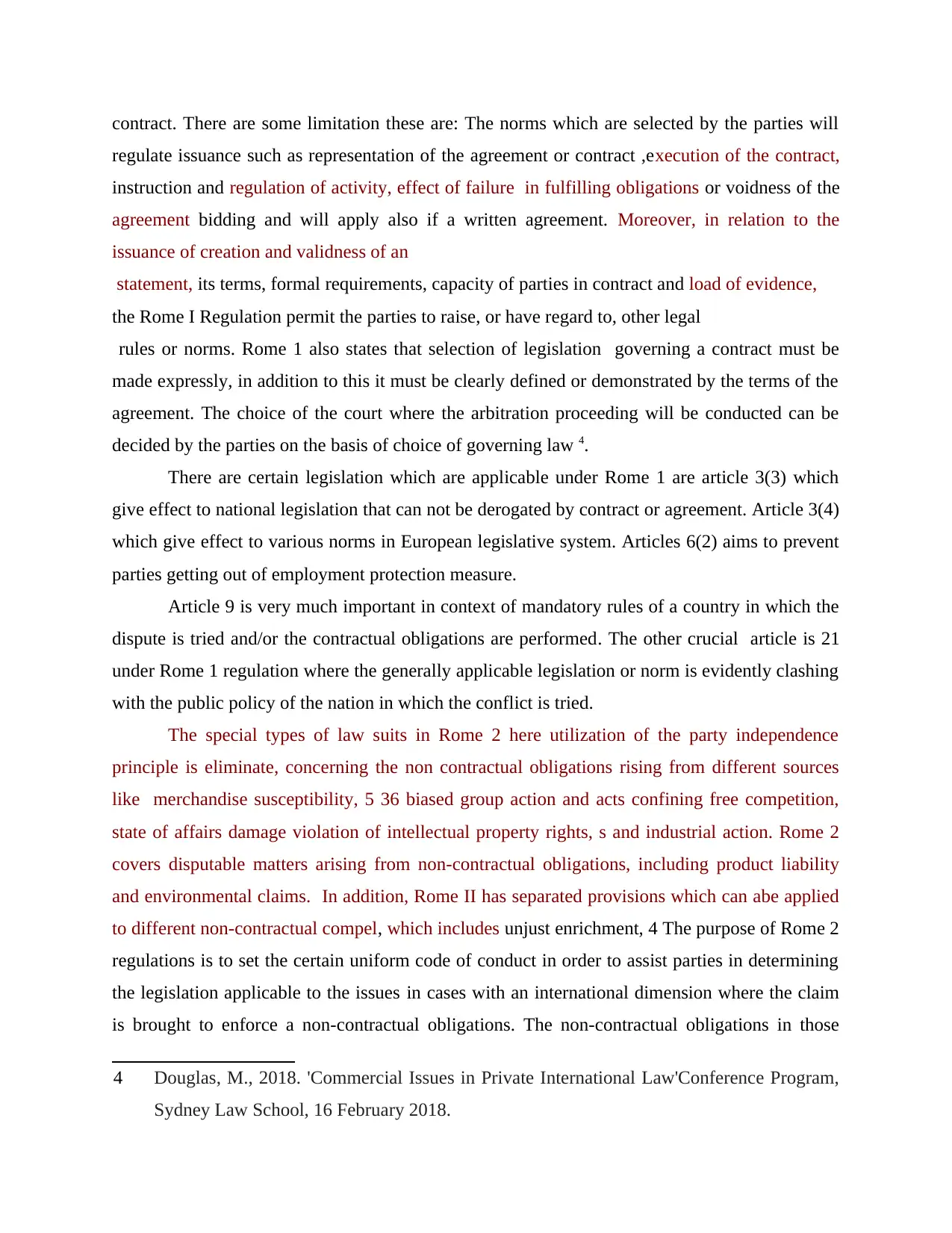
contract. There are some limitation these are: The norms which are selected by the parties will
regulate issuance such as representation of the agreement or contract ,execution of the contract,
instruction and regulation of activity, effect of failure in fulfilling obligations or voidness of the
agreement bidding and will apply also if a written agreement. Moreover, in relation to the
issuance of creation and validness of an
statement, its terms, formal requirements, capacity of parties in contract and load of evidence,
the Rome I Regulation permit the parties to raise, or have regard to, other legal
rules or norms. Rome 1 also states that selection of legislation governing a contract must be
made expressly, in addition to this it must be clearly defined or demonstrated by the terms of the
agreement. The choice of the court where the arbitration proceeding will be conducted can be
decided by the parties on the basis of choice of governing law 4.
There are certain legislation which are applicable under Rome 1 are article 3(3) which
give effect to national legislation that can not be derogated by contract or agreement. Article 3(4)
which give effect to various norms in European legislative system. Articles 6(2) aims to prevent
parties getting out of employment protection measure.
Article 9 is very much important in context of mandatory rules of a country in which the
dispute is tried and/or the contractual obligations are performed. The other crucial article is 21
under Rome 1 regulation where the generally applicable legislation or norm is evidently clashing
with the public policy of the nation in which the conflict is tried.
The special types of law suits in Rome 2 here utilization of the party independence
principle is eliminate, concerning the non contractual obligations rising from different sources
like merchandise susceptibility, 5 36 biased group action and acts confining free competition,
state of affairs damage violation of intellectual property rights, s and industrial action. Rome 2
covers disputable matters arising from non-contractual obligations, including product liability
and environmental claims. In addition, Rome II has separated provisions which can abe applied
to different non-contractual compel, which includes unjust enrichment, 4 The purpose of Rome 2
regulations is to set the certain uniform code of conduct in order to assist parties in determining
the legislation applicable to the issues in cases with an international dimension where the claim
is brought to enforce a non-contractual obligations. The non-contractual obligations in those
4 Douglas, M., 2018. 'Commercial Issues in Private International Law'Conference Program,
Sydney Law School, 16 February 2018.
regulate issuance such as representation of the agreement or contract ,execution of the contract,
instruction and regulation of activity, effect of failure in fulfilling obligations or voidness of the
agreement bidding and will apply also if a written agreement. Moreover, in relation to the
issuance of creation and validness of an
statement, its terms, formal requirements, capacity of parties in contract and load of evidence,
the Rome I Regulation permit the parties to raise, or have regard to, other legal
rules or norms. Rome 1 also states that selection of legislation governing a contract must be
made expressly, in addition to this it must be clearly defined or demonstrated by the terms of the
agreement. The choice of the court where the arbitration proceeding will be conducted can be
decided by the parties on the basis of choice of governing law 4.
There are certain legislation which are applicable under Rome 1 are article 3(3) which
give effect to national legislation that can not be derogated by contract or agreement. Article 3(4)
which give effect to various norms in European legislative system. Articles 6(2) aims to prevent
parties getting out of employment protection measure.
Article 9 is very much important in context of mandatory rules of a country in which the
dispute is tried and/or the contractual obligations are performed. The other crucial article is 21
under Rome 1 regulation where the generally applicable legislation or norm is evidently clashing
with the public policy of the nation in which the conflict is tried.
The special types of law suits in Rome 2 here utilization of the party independence
principle is eliminate, concerning the non contractual obligations rising from different sources
like merchandise susceptibility, 5 36 biased group action and acts confining free competition,
state of affairs damage violation of intellectual property rights, s and industrial action. Rome 2
covers disputable matters arising from non-contractual obligations, including product liability
and environmental claims. In addition, Rome II has separated provisions which can abe applied
to different non-contractual compel, which includes unjust enrichment, 4 The purpose of Rome 2
regulations is to set the certain uniform code of conduct in order to assist parties in determining
the legislation applicable to the issues in cases with an international dimension where the claim
is brought to enforce a non-contractual obligations. The non-contractual obligations in those
4 Douglas, M., 2018. 'Commercial Issues in Private International Law'Conference Program,
Sydney Law School, 16 February 2018.
⊘ This is a preview!⊘
Do you want full access?
Subscribe today to unlock all pages.

Trusted by 1+ million students worldwide
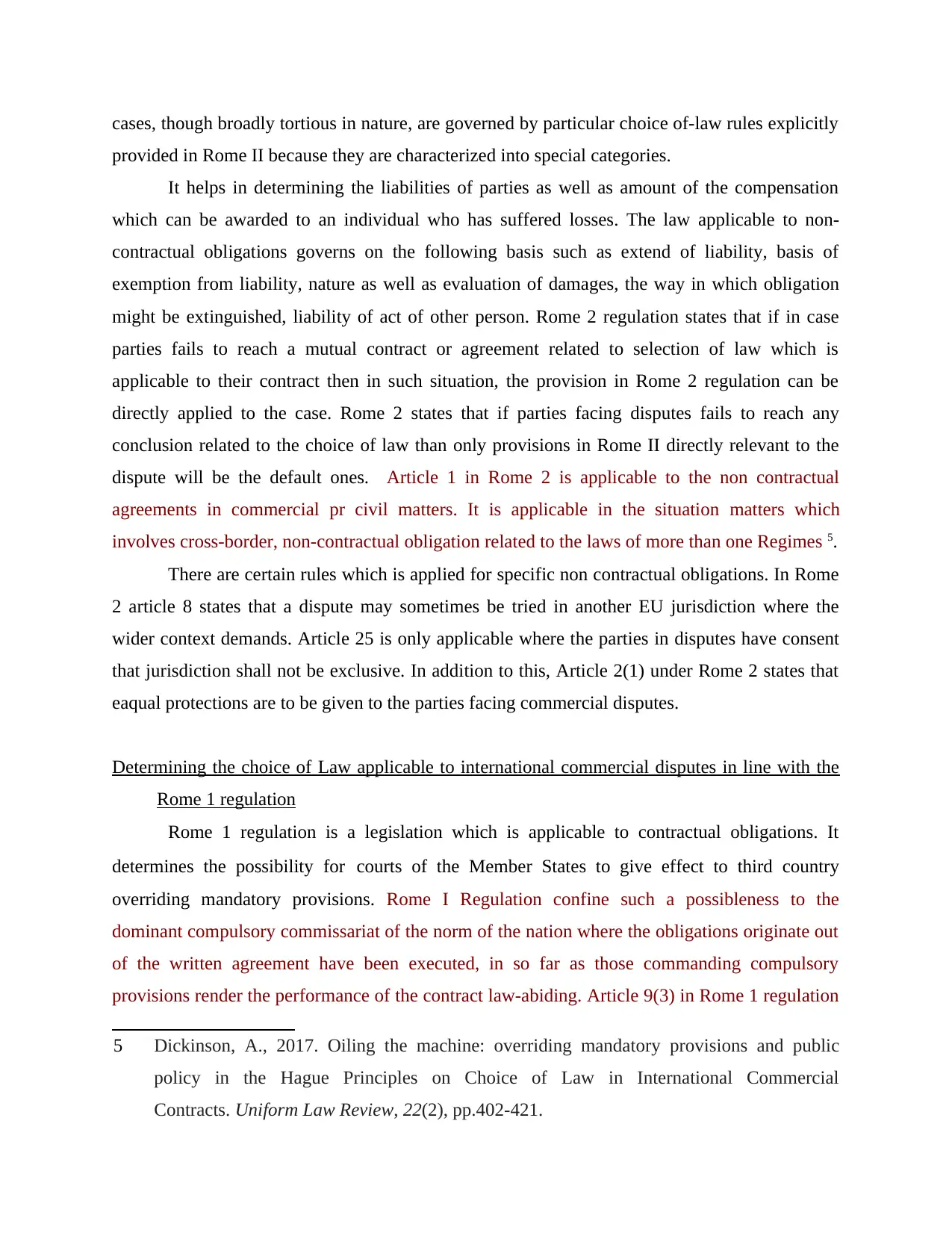
cases, though broadly tortious in nature, are governed by particular choice of-law rules explicitly
provided in Rome II because they are characterized into special categories.
It helps in determining the liabilities of parties as well as amount of the compensation
which can be awarded to an individual who has suffered losses. The law applicable to non-
contractual obligations governs on the following basis such as extend of liability, basis of
exemption from liability, nature as well as evaluation of damages, the way in which obligation
might be extinguished, liability of act of other person. Rome 2 regulation states that if in case
parties fails to reach a mutual contract or agreement related to selection of law which is
applicable to their contract then in such situation, the provision in Rome 2 regulation can be
directly applied to the case. Rome 2 states that if parties facing disputes fails to reach any
conclusion related to the choice of law than only provisions in Rome II directly relevant to the
dispute will be the default ones. Article 1 in Rome 2 is applicable to the non contractual
agreements in commercial pr civil matters. It is applicable in the situation matters which
involves cross-border, non-contractual obligation related to the laws of more than one Regimes 5.
There are certain rules which is applied for specific non contractual obligations. In Rome
2 article 8 states that a dispute may sometimes be tried in another EU jurisdiction where the
wider context demands. Article 25 is only applicable where the parties in disputes have consent
that jurisdiction shall not be exclusive. In addition to this, Article 2(1) under Rome 2 states that
eaqual protections are to be given to the parties facing commercial disputes.
Determining the choice of Law applicable to international commercial disputes in line with the
Rome 1 regulation
Rome 1 regulation is a legislation which is applicable to contractual obligations. It
determines the possibility for courts of the Member States to give effect to third country
overriding mandatory provisions. Rome I Regulation confine such a possibleness to the
dominant compulsory commissariat of the norm of the nation where the obligations originate out
of the written agreement have been executed, in so far as those commanding compulsory
provisions render the performance of the contract law-abiding. Article 9(3) in Rome 1 regulation
5 Dickinson, A., 2017. Oiling the machine: overriding mandatory provisions and public
policy in the Hague Principles on Choice of Law in International Commercial
Contracts. Uniform Law Review, 22(2), pp.402-421.
provided in Rome II because they are characterized into special categories.
It helps in determining the liabilities of parties as well as amount of the compensation
which can be awarded to an individual who has suffered losses. The law applicable to non-
contractual obligations governs on the following basis such as extend of liability, basis of
exemption from liability, nature as well as evaluation of damages, the way in which obligation
might be extinguished, liability of act of other person. Rome 2 regulation states that if in case
parties fails to reach a mutual contract or agreement related to selection of law which is
applicable to their contract then in such situation, the provision in Rome 2 regulation can be
directly applied to the case. Rome 2 states that if parties facing disputes fails to reach any
conclusion related to the choice of law than only provisions in Rome II directly relevant to the
dispute will be the default ones. Article 1 in Rome 2 is applicable to the non contractual
agreements in commercial pr civil matters. It is applicable in the situation matters which
involves cross-border, non-contractual obligation related to the laws of more than one Regimes 5.
There are certain rules which is applied for specific non contractual obligations. In Rome
2 article 8 states that a dispute may sometimes be tried in another EU jurisdiction where the
wider context demands. Article 25 is only applicable where the parties in disputes have consent
that jurisdiction shall not be exclusive. In addition to this, Article 2(1) under Rome 2 states that
eaqual protections are to be given to the parties facing commercial disputes.
Determining the choice of Law applicable to international commercial disputes in line with the
Rome 1 regulation
Rome 1 regulation is a legislation which is applicable to contractual obligations. It
determines the possibility for courts of the Member States to give effect to third country
overriding mandatory provisions. Rome I Regulation confine such a possibleness to the
dominant compulsory commissariat of the norm of the nation where the obligations originate out
of the written agreement have been executed, in so far as those commanding compulsory
provisions render the performance of the contract law-abiding. Article 9(3) in Rome 1 regulation
5 Dickinson, A., 2017. Oiling the machine: overriding mandatory provisions and public
policy in the Hague Principles on Choice of Law in International Commercial
Contracts. Uniform Law Review, 22(2), pp.402-421.
Paraphrase This Document
Need a fresh take? Get an instant paraphrase of this document with our AI Paraphraser
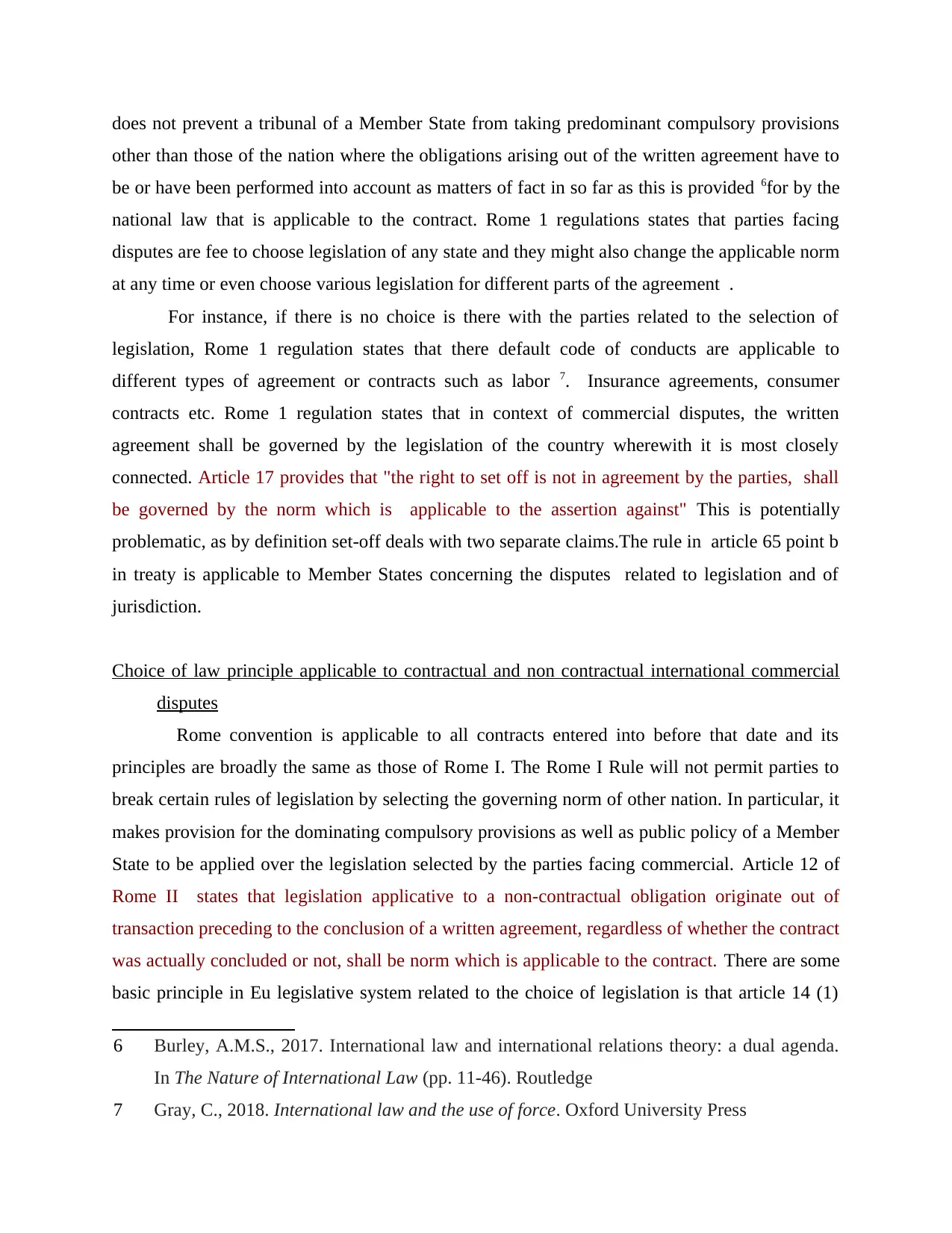
does not prevent a tribunal of a Member State from taking predominant compulsory provisions
other than those of the nation where the obligations arising out of the written agreement have to
be or have been performed into account as matters of fact in so far as this is provided 6for by the
national law that is applicable to the contract. Rome 1 regulations states that parties facing
disputes are fee to choose legislation of any state and they might also change the applicable norm
at any time or even choose various legislation for different parts of the agreement .
For instance, if there is no choice is there with the parties related to the selection of
legislation, Rome 1 regulation states that there default code of conducts are applicable to
different types of agreement or contracts such as labor 7. Insurance agreements, consumer
contracts etc. Rome 1 regulation states that in context of commercial disputes, the written
agreement shall be governed by the legislation of the country wherewith it is most closely
connected. Article 17 provides that "the right to set off is not in agreement by the parties, shall
be governed by the norm which is applicable to the assertion against" This is potentially
problematic, as by definition set-off deals with two separate claims.The rule in article 65 point b
in treaty is applicable to Member States concerning the disputes related to legislation and of
jurisdiction.
Choice of law principle applicable to contractual and non contractual international commercial
disputes
Rome convention is applicable to all contracts entered into before that date and its
principles are broadly the same as those of Rome I. The Rome I Rule will not permit parties to
break certain rules of legislation by selecting the governing norm of other nation. In particular, it
makes provision for the dominating compulsory provisions as well as public policy of a Member
State to be applied over the legislation selected by the parties facing commercial. Article 12 of
Rome II states that legislation applicative to a non-contractual obligation originate out of
transaction preceding to the conclusion of a written agreement, regardless of whether the contract
was actually concluded or not, shall be norm which is applicable to the contract. There are some
basic principle in Eu legislative system related to the choice of legislation is that article 14 (1)
6 Burley, A.M.S., 2017. International law and international relations theory: a dual agenda.
In The Nature of International Law (pp. 11-46). Routledge
7 Gray, C., 2018. International law and the use of force. Oxford University Press
other than those of the nation where the obligations arising out of the written agreement have to
be or have been performed into account as matters of fact in so far as this is provided 6for by the
national law that is applicable to the contract. Rome 1 regulations states that parties facing
disputes are fee to choose legislation of any state and they might also change the applicable norm
at any time or even choose various legislation for different parts of the agreement .
For instance, if there is no choice is there with the parties related to the selection of
legislation, Rome 1 regulation states that there default code of conducts are applicable to
different types of agreement or contracts such as labor 7. Insurance agreements, consumer
contracts etc. Rome 1 regulation states that in context of commercial disputes, the written
agreement shall be governed by the legislation of the country wherewith it is most closely
connected. Article 17 provides that "the right to set off is not in agreement by the parties, shall
be governed by the norm which is applicable to the assertion against" This is potentially
problematic, as by definition set-off deals with two separate claims.The rule in article 65 point b
in treaty is applicable to Member States concerning the disputes related to legislation and of
jurisdiction.
Choice of law principle applicable to contractual and non contractual international commercial
disputes
Rome convention is applicable to all contracts entered into before that date and its
principles are broadly the same as those of Rome I. The Rome I Rule will not permit parties to
break certain rules of legislation by selecting the governing norm of other nation. In particular, it
makes provision for the dominating compulsory provisions as well as public policy of a Member
State to be applied over the legislation selected by the parties facing commercial. Article 12 of
Rome II states that legislation applicative to a non-contractual obligation originate out of
transaction preceding to the conclusion of a written agreement, regardless of whether the contract
was actually concluded or not, shall be norm which is applicable to the contract. There are some
basic principle in Eu legislative system related to the choice of legislation is that article 14 (1)
6 Burley, A.M.S., 2017. International law and international relations theory: a dual agenda.
In The Nature of International Law (pp. 11-46). Routledge
7 Gray, C., 2018. International law and the use of force. Oxford University Press
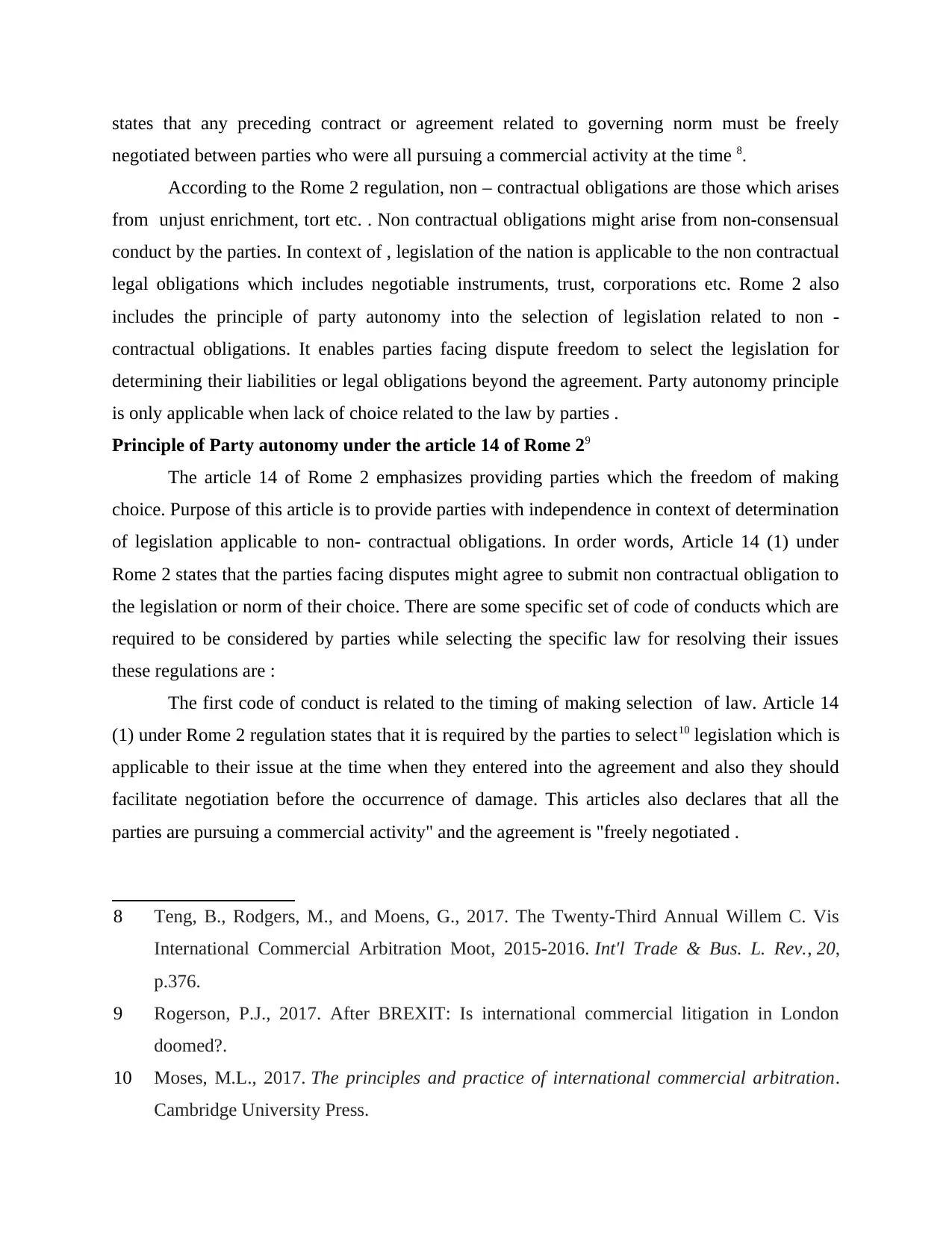
states that any preceding contract or agreement related to governing norm must be freely
negotiated between parties who were all pursuing a commercial activity at the time 8.
According to the Rome 2 regulation, non – contractual obligations are those which arises
from unjust enrichment, tort etc. . Non contractual obligations might arise from non-consensual
conduct by the parties. In context of , legislation of the nation is applicable to the non contractual
legal obligations which includes negotiable instruments, trust, corporations etc. Rome 2 also
includes the principle of party autonomy into the selection of legislation related to non -
contractual obligations. It enables parties facing dispute freedom to select the legislation for
determining their liabilities or legal obligations beyond the agreement. Party autonomy principle
is only applicable when lack of choice related to the law by parties .
Principle of Party autonomy under the article 14 of Rome 29
The article 14 of Rome 2 emphasizes providing parties which the freedom of making
choice. Purpose of this article is to provide parties with independence in context of determination
of legislation applicable to non- contractual obligations. In order words, Article 14 (1) under
Rome 2 states that the parties facing disputes might agree to submit non contractual obligation to
the legislation or norm of their choice. There are some specific set of code of conducts which are
required to be considered by parties while selecting the specific law for resolving their issues
these regulations are :
The first code of conduct is related to the timing of making selection of law. Article 14
(1) under Rome 2 regulation states that it is required by the parties to select10 legislation which is
applicable to their issue at the time when they entered into the agreement and also they should
facilitate negotiation before the occurrence of damage. This articles also declares that all the
parties are pursuing a commercial activity" and the agreement is "freely negotiated .
8 Teng, B., Rodgers, M., and Moens, G., 2017. The Twenty-Third Annual Willem C. Vis
International Commercial Arbitration Moot, 2015-2016. Int'l Trade & Bus. L. Rev., 20,
p.376.
9 Rogerson, P.J., 2017. After BREXIT: Is international commercial litigation in London
doomed?.
10 Moses, M.L., 2017. The principles and practice of international commercial arbitration.
Cambridge University Press.
negotiated between parties who were all pursuing a commercial activity at the time 8.
According to the Rome 2 regulation, non – contractual obligations are those which arises
from unjust enrichment, tort etc. . Non contractual obligations might arise from non-consensual
conduct by the parties. In context of , legislation of the nation is applicable to the non contractual
legal obligations which includes negotiable instruments, trust, corporations etc. Rome 2 also
includes the principle of party autonomy into the selection of legislation related to non -
contractual obligations. It enables parties facing dispute freedom to select the legislation for
determining their liabilities or legal obligations beyond the agreement. Party autonomy principle
is only applicable when lack of choice related to the law by parties .
Principle of Party autonomy under the article 14 of Rome 29
The article 14 of Rome 2 emphasizes providing parties which the freedom of making
choice. Purpose of this article is to provide parties with independence in context of determination
of legislation applicable to non- contractual obligations. In order words, Article 14 (1) under
Rome 2 states that the parties facing disputes might agree to submit non contractual obligation to
the legislation or norm of their choice. There are some specific set of code of conducts which are
required to be considered by parties while selecting the specific law for resolving their issues
these regulations are :
The first code of conduct is related to the timing of making selection of law. Article 14
(1) under Rome 2 regulation states that it is required by the parties to select10 legislation which is
applicable to their issue at the time when they entered into the agreement and also they should
facilitate negotiation before the occurrence of damage. This articles also declares that all the
parties are pursuing a commercial activity" and the agreement is "freely negotiated .
8 Teng, B., Rodgers, M., and Moens, G., 2017. The Twenty-Third Annual Willem C. Vis
International Commercial Arbitration Moot, 2015-2016. Int'l Trade & Bus. L. Rev., 20,
p.376.
9 Rogerson, P.J., 2017. After BREXIT: Is international commercial litigation in London
doomed?.
10 Moses, M.L., 2017. The principles and practice of international commercial arbitration.
Cambridge University Press.
⊘ This is a preview!⊘
Do you want full access?
Subscribe today to unlock all pages.

Trusted by 1+ million students worldwide
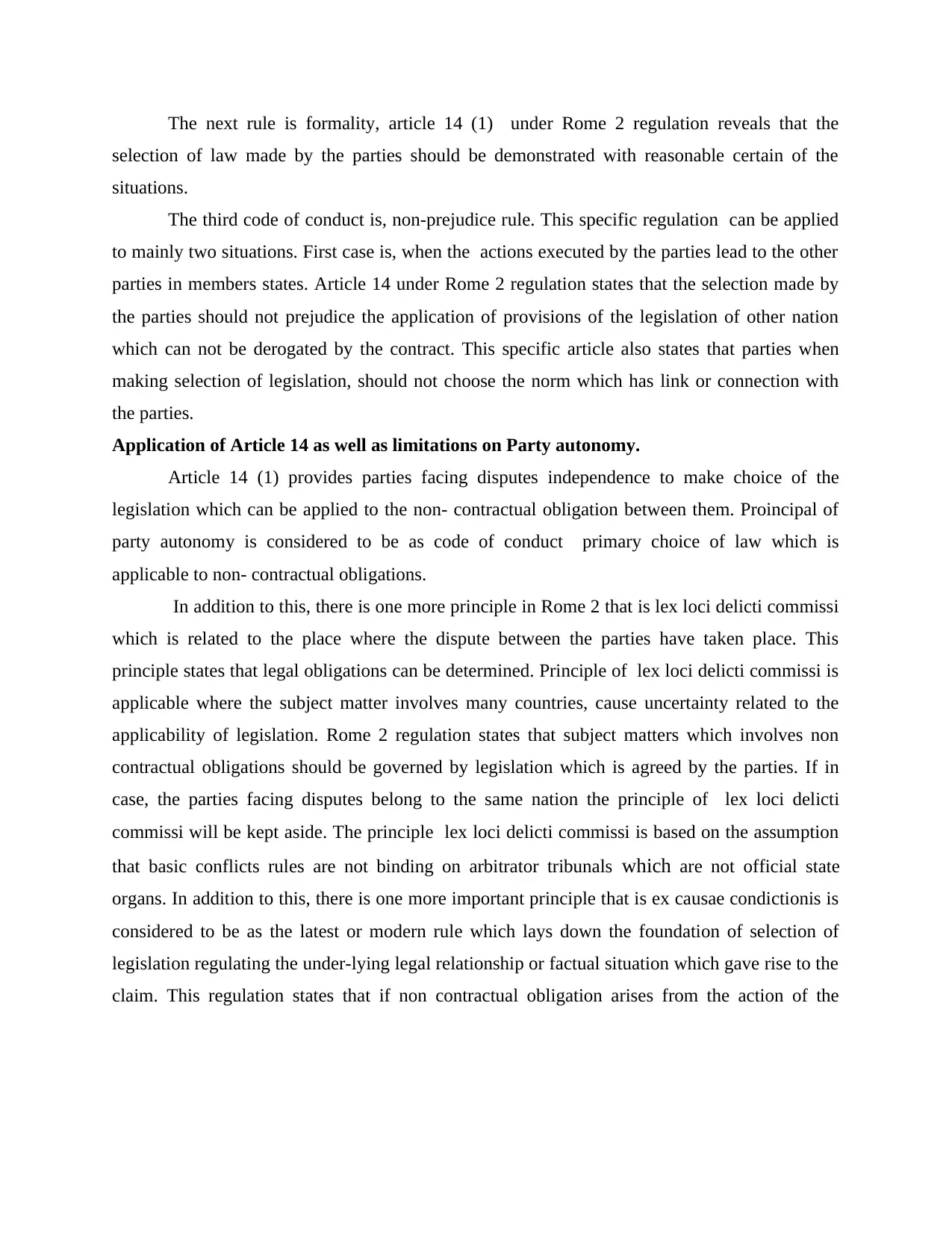
The next rule is formality, article 14 (1) under Rome 2 regulation reveals that the
selection of law made by the parties should be demonstrated with reasonable certain of the
situations.
The third code of conduct is, non-prejudice rule. This specific regulation can be applied
to mainly two situations. First case is, when the actions executed by the parties lead to the other
parties in members states. Article 14 under Rome 2 regulation states that the selection made by
the parties should not prejudice the application of provisions of the legislation of other nation
which can not be derogated by the contract. This specific article also states that parties when
making selection of legislation, should not choose the norm which has link or connection with
the parties.
Application of Article 14 as well as limitations on Party autonomy.
Article 14 (1) provides parties facing disputes independence to make choice of the
legislation which can be applied to the non- contractual obligation between them. Proincipal of
party autonomy is considered to be as code of conduct primary choice of law which is
applicable to non- contractual obligations.
In addition to this, there is one more principle in Rome 2 that is lex loci delicti commissi
which is related to the place where the dispute between the parties have taken place. This
principle states that legal obligations can be determined. Principle of lex loci delicti commissi is
applicable where the subject matter involves many countries, cause uncertainty related to the
applicability of legislation. Rome 2 regulation states that subject matters which involves non
contractual obligations should be governed by legislation which is agreed by the parties. If in
case, the parties facing disputes belong to the same nation the principle of lex loci delicti
commissi will be kept aside. The principle lex loci delicti commissi is based on the assumption
that basic conflicts rules are not binding on arbitrator tribunals which are not official state
organs. In addition to this, there is one more important principle that is ex causae condictionis is
considered to be as the latest or modern rule which lays down the foundation of selection of
legislation regulating the under-lying legal relationship or factual situation which gave rise to the
claim. This regulation states that if non contractual obligation arises from the action of the
selection of law made by the parties should be demonstrated with reasonable certain of the
situations.
The third code of conduct is, non-prejudice rule. This specific regulation can be applied
to mainly two situations. First case is, when the actions executed by the parties lead to the other
parties in members states. Article 14 under Rome 2 regulation states that the selection made by
the parties should not prejudice the application of provisions of the legislation of other nation
which can not be derogated by the contract. This specific article also states that parties when
making selection of legislation, should not choose the norm which has link or connection with
the parties.
Application of Article 14 as well as limitations on Party autonomy.
Article 14 (1) provides parties facing disputes independence to make choice of the
legislation which can be applied to the non- contractual obligation between them. Proincipal of
party autonomy is considered to be as code of conduct primary choice of law which is
applicable to non- contractual obligations.
In addition to this, there is one more principle in Rome 2 that is lex loci delicti commissi
which is related to the place where the dispute between the parties have taken place. This
principle states that legal obligations can be determined. Principle of lex loci delicti commissi is
applicable where the subject matter involves many countries, cause uncertainty related to the
applicability of legislation. Rome 2 regulation states that subject matters which involves non
contractual obligations should be governed by legislation which is agreed by the parties. If in
case, the parties facing disputes belong to the same nation the principle of lex loci delicti
commissi will be kept aside. The principle lex loci delicti commissi is based on the assumption
that basic conflicts rules are not binding on arbitrator tribunals which are not official state
organs. In addition to this, there is one more important principle that is ex causae condictionis is
considered to be as the latest or modern rule which lays down the foundation of selection of
legislation regulating the under-lying legal relationship or factual situation which gave rise to the
claim. This regulation states that if non contractual obligation arises from the action of the
Paraphrase This Document
Need a fresh take? Get an instant paraphrase of this document with our AI Paraphraser
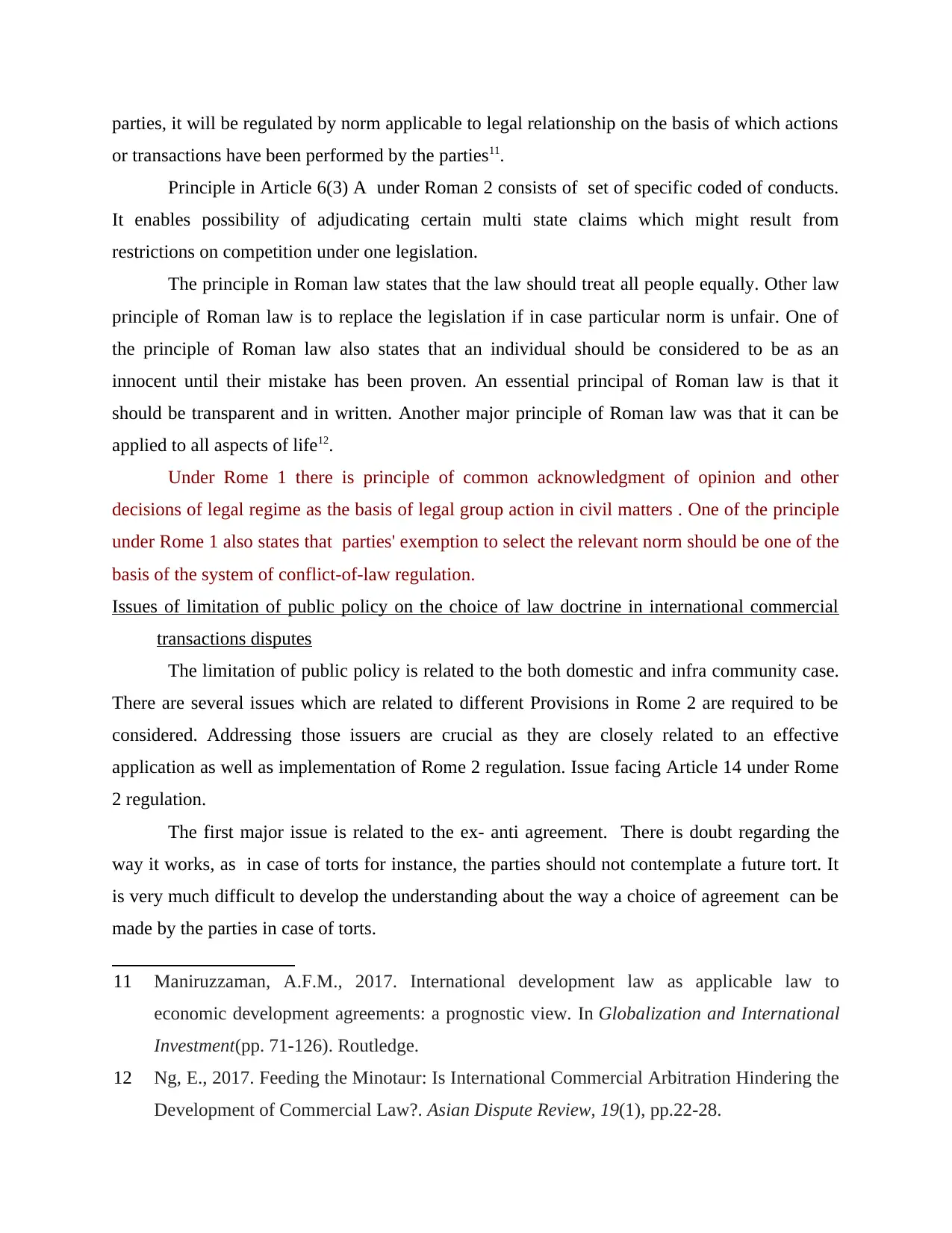
parties, it will be regulated by norm applicable to legal relationship on the basis of which actions
or transactions have been performed by the parties11.
Principle in Article 6(3) A under Roman 2 consists of set of specific coded of conducts.
It enables possibility of adjudicating certain multi state claims which might result from
restrictions on competition under one legislation.
The principle in Roman law states that the law should treat all people equally. Other law
principle of Roman law is to replace the legislation if in case particular norm is unfair. One of
the principle of Roman law also states that an individual should be considered to be as an
innocent until their mistake has been proven. An essential principal of Roman law is that it
should be transparent and in written. Another major principle of Roman law was that it can be
applied to all aspects of life12.
Under Rome 1 there is principle of common acknowledgment of opinion and other
decisions of legal regime as the basis of legal group action in civil matters . One of the principle
under Rome 1 also states that parties' exemption to select the relevant norm should be one of the
basis of the system of conflict-of-law regulation.
Issues of limitation of public policy on the choice of law doctrine in international commercial
transactions disputes
The limitation of public policy is related to the both domestic and infra community case.
There are several issues which are related to different Provisions in Rome 2 are required to be
considered. Addressing those issuers are crucial as they are closely related to an effective
application as well as implementation of Rome 2 regulation. Issue facing Article 14 under Rome
2 regulation.
The first major issue is related to the ex- anti agreement. There is doubt regarding the
way it works, as in case of torts for instance, the parties should not contemplate a future tort. It
is very much difficult to develop the understanding about the way a choice of agreement can be
made by the parties in case of torts.
11 Maniruzzaman, A.F.M., 2017. International development law as applicable law to
economic development agreements: a prognostic view. In Globalization and International
Investment(pp. 71-126). Routledge.
12 Ng, E., 2017. Feeding the Minotaur: Is International Commercial Arbitration Hindering the
Development of Commercial Law?. Asian Dispute Review, 19(1), pp.22-28.
or transactions have been performed by the parties11.
Principle in Article 6(3) A under Roman 2 consists of set of specific coded of conducts.
It enables possibility of adjudicating certain multi state claims which might result from
restrictions on competition under one legislation.
The principle in Roman law states that the law should treat all people equally. Other law
principle of Roman law is to replace the legislation if in case particular norm is unfair. One of
the principle of Roman law also states that an individual should be considered to be as an
innocent until their mistake has been proven. An essential principal of Roman law is that it
should be transparent and in written. Another major principle of Roman law was that it can be
applied to all aspects of life12.
Under Rome 1 there is principle of common acknowledgment of opinion and other
decisions of legal regime as the basis of legal group action in civil matters . One of the principle
under Rome 1 also states that parties' exemption to select the relevant norm should be one of the
basis of the system of conflict-of-law regulation.
Issues of limitation of public policy on the choice of law doctrine in international commercial
transactions disputes
The limitation of public policy is related to the both domestic and infra community case.
There are several issues which are related to different Provisions in Rome 2 are required to be
considered. Addressing those issuers are crucial as they are closely related to an effective
application as well as implementation of Rome 2 regulation. Issue facing Article 14 under Rome
2 regulation.
The first major issue is related to the ex- anti agreement. There is doubt regarding the
way it works, as in case of torts for instance, the parties should not contemplate a future tort. It
is very much difficult to develop the understanding about the way a choice of agreement can be
made by the parties in case of torts.
11 Maniruzzaman, A.F.M., 2017. International development law as applicable law to
economic development agreements: a prognostic view. In Globalization and International
Investment(pp. 71-126). Routledge.
12 Ng, E., 2017. Feeding the Minotaur: Is International Commercial Arbitration Hindering the
Development of Commercial Law?. Asian Dispute Review, 19(1), pp.22-28.
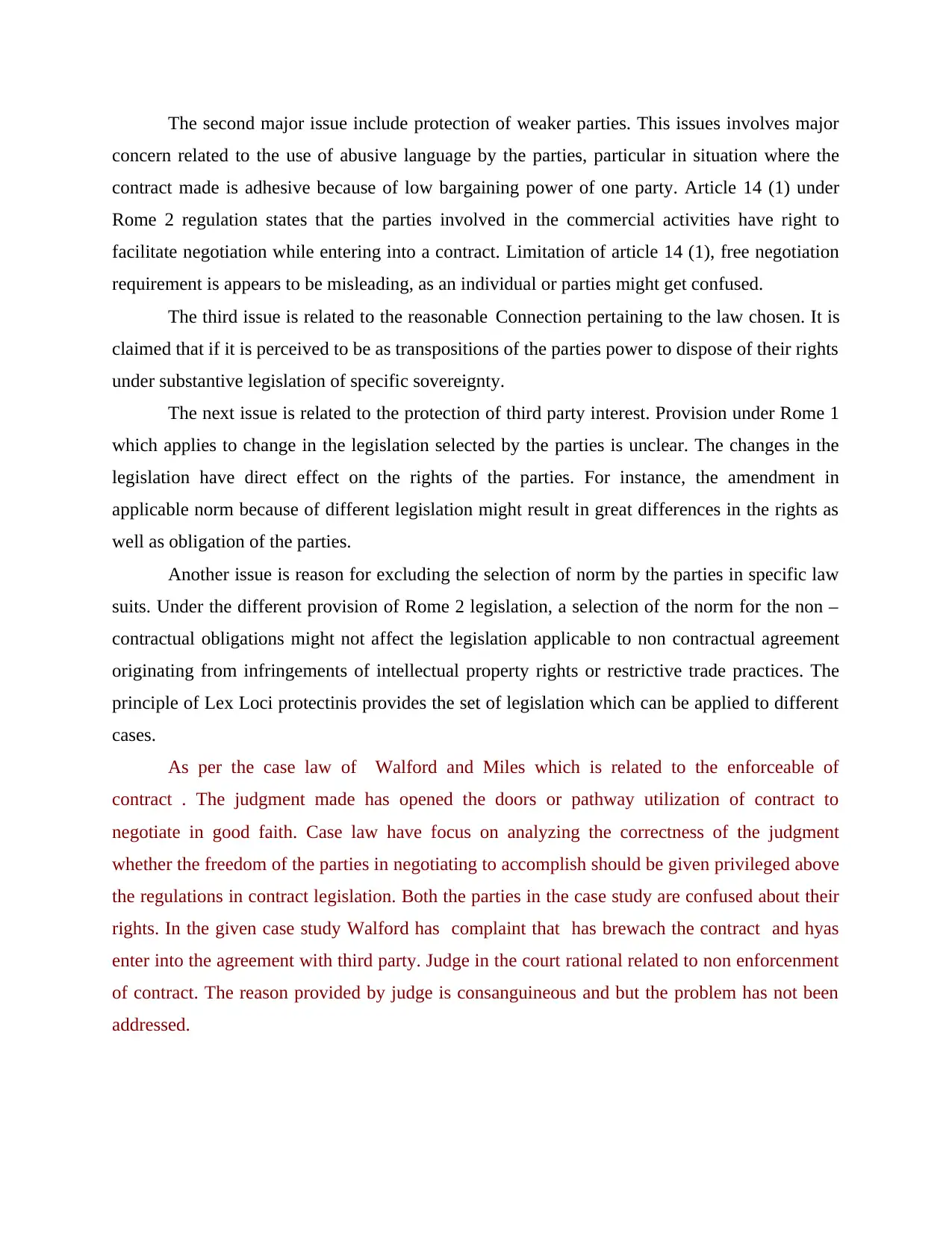
The second major issue include protection of weaker parties. This issues involves major
concern related to the use of abusive language by the parties, particular in situation where the
contract made is adhesive because of low bargaining power of one party. Article 14 (1) under
Rome 2 regulation states that the parties involved in the commercial activities have right to
facilitate negotiation while entering into a contract. Limitation of article 14 (1), free negotiation
requirement is appears to be misleading, as an individual or parties might get confused.
The third issue is related to the reasonable Connection pertaining to the law chosen. It is
claimed that if it is perceived to be as transpositions of the parties power to dispose of their rights
under substantive legislation of specific sovereignty.
The next issue is related to the protection of third party interest. Provision under Rome 1
which applies to change in the legislation selected by the parties is unclear. The changes in the
legislation have direct effect on the rights of the parties. For instance, the amendment in
applicable norm because of different legislation might result in great differences in the rights as
well as obligation of the parties.
Another issue is reason for excluding the selection of norm by the parties in specific law
suits. Under the different provision of Rome 2 legislation, a selection of the norm for the non –
contractual obligations might not affect the legislation applicable to non contractual agreement
originating from infringements of intellectual property rights or restrictive trade practices. The
principle of Lex Loci protectinis provides the set of legislation which can be applied to different
cases.
As per the case law of Walford and Miles which is related to the enforceable of
contract . The judgment made has opened the doors or pathway utilization of contract to
negotiate in good faith. Case law have focus on analyzing the correctness of the judgment
whether the freedom of the parties in negotiating to accomplish should be given privileged above
the regulations in contract legislation. Both the parties in the case study are confused about their
rights. In the given case study Walford has complaint that has brewach the contract and hyas
enter into the agreement with third party. Judge in the court rational related to non enforcenment
of contract. The reason provided by judge is consanguineous and but the problem has not been
addressed.
concern related to the use of abusive language by the parties, particular in situation where the
contract made is adhesive because of low bargaining power of one party. Article 14 (1) under
Rome 2 regulation states that the parties involved in the commercial activities have right to
facilitate negotiation while entering into a contract. Limitation of article 14 (1), free negotiation
requirement is appears to be misleading, as an individual or parties might get confused.
The third issue is related to the reasonable Connection pertaining to the law chosen. It is
claimed that if it is perceived to be as transpositions of the parties power to dispose of their rights
under substantive legislation of specific sovereignty.
The next issue is related to the protection of third party interest. Provision under Rome 1
which applies to change in the legislation selected by the parties is unclear. The changes in the
legislation have direct effect on the rights of the parties. For instance, the amendment in
applicable norm because of different legislation might result in great differences in the rights as
well as obligation of the parties.
Another issue is reason for excluding the selection of norm by the parties in specific law
suits. Under the different provision of Rome 2 legislation, a selection of the norm for the non –
contractual obligations might not affect the legislation applicable to non contractual agreement
originating from infringements of intellectual property rights or restrictive trade practices. The
principle of Lex Loci protectinis provides the set of legislation which can be applied to different
cases.
As per the case law of Walford and Miles which is related to the enforceable of
contract . The judgment made has opened the doors or pathway utilization of contract to
negotiate in good faith. Case law have focus on analyzing the correctness of the judgment
whether the freedom of the parties in negotiating to accomplish should be given privileged above
the regulations in contract legislation. Both the parties in the case study are confused about their
rights. In the given case study Walford has complaint that has brewach the contract and hyas
enter into the agreement with third party. Judge in the court rational related to non enforcenment
of contract. The reason provided by judge is consanguineous and but the problem has not been
addressed.
⊘ This is a preview!⊘
Do you want full access?
Subscribe today to unlock all pages.

Trusted by 1+ million students worldwide
1 out of 16
Related Documents
Your All-in-One AI-Powered Toolkit for Academic Success.
+13062052269
info@desklib.com
Available 24*7 on WhatsApp / Email
![[object Object]](/_next/static/media/star-bottom.7253800d.svg)
Unlock your academic potential
Copyright © 2020–2026 A2Z Services. All Rights Reserved. Developed and managed by ZUCOL.





